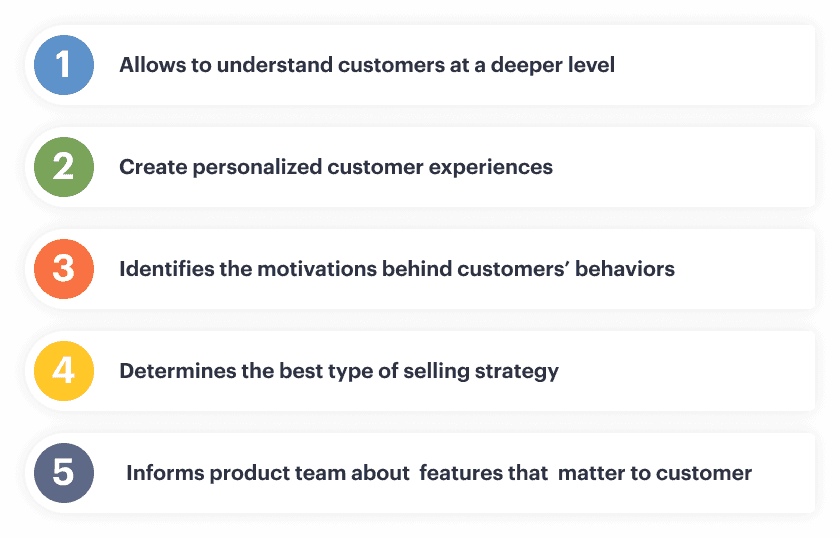Customer intelligence is essential in every industry. It provides insights into customers’ pain points, behaviors, expectations, motivations, and other areas of their buying journeys. No wonder customer intelligence can make all the difference between a thriving business and a failing one.
In this article, let’s discover more about customer intelligence, its benefits, best practices, and tools that help implement customer intelligence successfully.
What is Customer Intelligence?
Customer intelligence refers to collecting and analyzing customer data to discover customer insights that help improve customer experiences, enhance sales performance, support product development, and inform other business decisions.
Customer Intelligence Benefits

Implementing customer intelligence allows you to understand your customers at a deeper level. When you truly know what your customers want, you can talk to them in their own language and segment them into different groups based on demographics, behaviors, and interests.
From that, you can design marketing communications tailored to specific segments and create personalized customer experiences. PwC’s research found that “good customer experience minimizes friction, maximizes speed and efficiency and maintains a human element, embedded within the automation, AI or other technologies. It leaves consumers feeling heard, seen, and appreciated. It has a tangible impact that can be measured in dollars and cents.”
Besides that, customer intelligence allows you to identify the motivations behind customers’ behaviors. For example, why they purchase from you, why they stop buying, why they abandon their cart and more. Using those insights, you can come up with a marketing plan to prevent customer churn, increase customer loyalty, and drive repeat purchases.
For sales reps, insights collected from customer intelligence tools allow them to determine what type of selling strategy that they should apply to a specific buyer. Soft selling or hard selling? Social selling or high-pressure selling? The more information a salesperson has, the easier it’ll be for them to communicate with the buyer.
Last but not least, customer intelligence helps inform your product team about new features or new products that really matter to your customers. This is a great way to ensure product-market fit.
Customer Intelligence Techniques
Follow these tips to develop an effective customer intelligence strategy:
1. Collecting Customer Data Across Channels
There are several ways to gather customer data, for example:
- Surveys: Your support team, sales team, marketing team, and product team can use surveys to measure customer experience. You can try market research, Net Promoter Score (NPS), Customer Satisfaction (CSAT), and Customer Effort Score (CES) — each of them helps collect different customer data.
- Interviews: Interviews are great if you have many questions to ask your customers and want to find the answers that they often don’t share in a questionnaire. When you conduct an interview, you can also evaluate customers’ emotions and body language, which might reveal a lot about their personalities.
- Customer service platform: Customer service platform (or customer support tool or helpdesk or ticket managing system) stores customer information from emails, chat, phone, social media conversations.
- Customer relationship management (CRM): Customer profiles, sales emails, sales calls, meeting notes, etc., live inside your CRM. This type of data is critical for your sales team to improve sales performance.
2. Pick Your North Star Metric
Not all customer data is important. You need to know the most important metrics you should focus on to determine what you should track and what tools you should use.
Some sales metrics you might want to consider:
- Average sales cycle length
- Win/loss ratio
- Close rate
- Cost per lead
- Average lead response time
- Customer acquisition cost
- Customer churn rate
- Average purchase value
- Sales to date
- Sales by product
3. Analyze Your Data and Act On Insights
Once you have all the data you need, you can start an analysis. You can do it manually or take advantage of sales operations software to simplify your analysis process and get it done quickly. Click to learn more about how to analyze sales data.
Through the analysis, you’ll collect crucial insights that are beneficial to all of your teams. Decide what each team wants to hear and share the insights relevant to their needs.
Customer Intelligence Software Examples
The technology is a critical component of a successful customer intelligence strategy as it’ll help create a single source of truth for your customer data.
Customer intelligence software powered by artificial intelligence (AI) like Revenue Grid is a powerful system to monitor data in real-time. Revenue Grid automatically collects customer data from all channels and turns it into actionable insights that guide your sales team’s success. The data is updated regularly, and all your teams can access and update it any time with ease, so no important information will be missed.
Trusted by 800,000 sales professionals, Revenue Grid helps you uncover trends and patterns so you can decide where to focus and act. It works seamlessly with Salesforce and CRMs from SAP, Oracle, and Microsoft and is scalable enough to meet your business needs as your sales and data confidence grows.